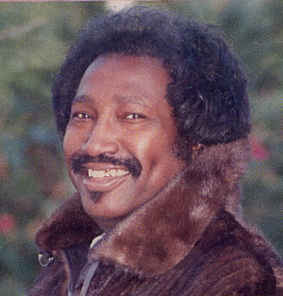A couple of weeks ago I wrote about Danny White, a southern soul singer who toiled for years looking for a hit that proved elusive. This week, I’ll take a look at a singer who managed to find that hit, even reaching to Top 20 on one occasion, before fading from the memory of most people.
Garland Green was born in Mississippi, one or eleven children. He joined the great northern migration when he moved to Chicago at the age of 16. Green was still in high school when his singing talent came to the attention of Argia Collins, a local restaurateur. Collins became Green’s patron and paid for him to attend the Chicago Conservatory of Music where Green studied voice and piano.
While he was in school Green began to sing in the clubs around town and he won a talent contest at a place called the Trocadero. The win earned him the chance to open a show for Lou Rawls and Earl Hines. Joshie Jo Armstead was in the audience the night of the concert. Armstrong had written songs with Nick Ashford and Valerie Simpson and she saw something in Green. Armstrong arranged for Green to record in Detroit and the resulting single, “Girl I Love You,” found enough local success that MCA Records picked it up for national distribution on their Revue Records imprint.

Green recorded a few more singles for Revue before being moved up to MCA’s most prominent label, Uni Records. “Jealous Kind of Fella” was a song co-written by Armstead and Green along with R. Browner, and M. Dollinson. When the single was released in 1969 it raced up the charts, reaching #5 on the R&B chart and winning a Top 20 spot on the pop chart while selling a million copies. Unfortunately, the follow-up single, the oddly titled “Don’t Think I’m a Violent Guy,” failed to come anywhere near matching the performance of “Jealous Kind of Fella,” not even cracking the Top 100. That put an end to not only Green’s association with MCA but his partnership with Armstead as well.
Green landed at Cotillion Records, an Atlantic subsidiary. He released five singles for the label but only the Donny Hathaway-produced and arranged “Plain and Simple Girl” found any success. The single was a Top 20 R&B hit but again didn’t crack the pop Top 100. The lack of success led Green to depart Cotillion for Spring Records. There he released five more singles including “Let the Good Times Roll” (not the Shirley & Lee song), and “Bumpin’ and Stompin’.” None of the singles found anything more than minor success on the R&B chart which led Green to yet another label, RCA.
At RCA, Green released three more singles and an album that was produced by Leon Haywood. The search for another hit continued to come up empty for Green. He moved to California in hopes of changing his luck. There he recorded for an indie label called Ocean-Front Records. The album that Green released for the label was co-produced by Lamont Dozier but only the single “Trying to Hold On to My Woman,” a song that had been a hit for Dozier a decade earlier, found any traction, reaching #63 on the R&B chart.
There was no quit in Green, however. He continued to record and release his own records until 2011 when he signed a new record deal with a subsidiary of CDS Records called Special Soul Music. The following year, Green released his first album of new material in 29 years, the appropriately titled I Should’ve Been the One. Indeed.





Comments